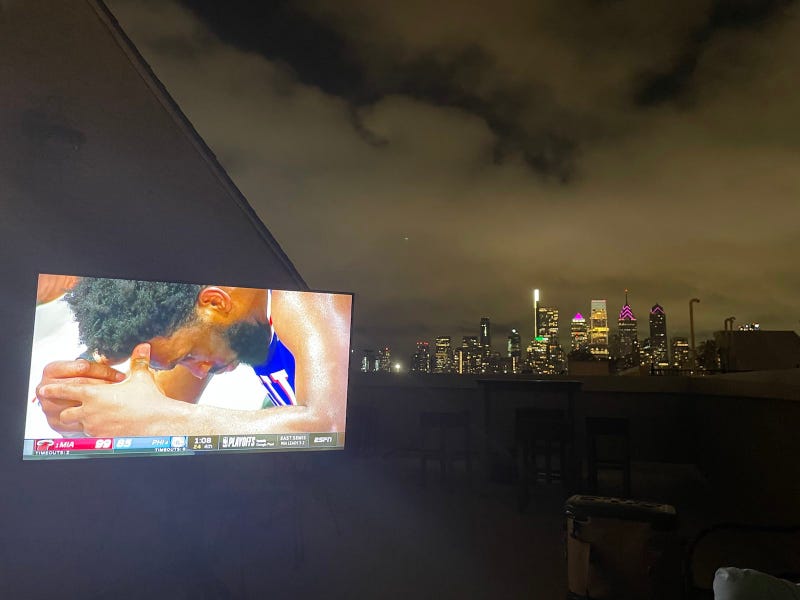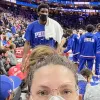Basketball Is Broken
After a second consecutive semifinals loss, a Sixers fan loses faith in the Process—in more ways than one.

Edited by Spencer Ackerman
EDITOR'S NOTE: It's been a lot of depressing posts lately and with the Conference Finals upon us, let's have a change of pace. One of my favorite people to talk basketball with is my friend Erica. A text thread after her Sixers flamed out of the second round—again—became a reminder that her NBA takes are too good to keep on my phone, and this piece was the result. (Sam's comment: "lmao this is a different definition of FOREVER WARS but I guess I can see it.") This one is like the Anti-Joy of Basketball—which I'm cool with, since Andrew Kuo said on a recent Cookies episode that NBA fandom may be an indicator of midlife crisis and I can't stop thinking about that. Anyway! Here's Erica:
ON THURSDAY, a few hours before the Miami Heat ended our season, I was standing in line at a state store in South Philadelphia, carrying a bottle of tequila and a large box full of carpet cleaner. It was mental preparation for cleaning up the giant shit I expected the Sixers to take that night.
The security guard, I overheard, didn't have that worry at all. He was trading takes with someone else in the store and we started chatting about our expectations for the next two—lol—games. Much as I was preparing myself for losing, we both were assured the Sixers would force a Game 7. But he had a weird certainty about it.
This guy told me that Jimmy Butler was suspended for Game 6 that night. What had happened was, he said, Secaucus reviewed the previous game’s hit on Embiid, which sent him to the floor writhing for so long that it necessitated a timeout call by Doc Rivers and an argument with the refs that resulted in Rivers getting tech'd.
Certain as this guy was, that would have been a weird move, especially considering Dewayne Dedmon—not Butler—was responsible for Embiid getting a rebound smashed into his broken orbital. I hadn't heard anything about a Butler suspension, which would have been the only thing Basketball Twitter talked about ahead of Game 6, to say nothing of everyone in Philadelphia. But I was lugging too much stuff to pull out my phone in the store and fact-check him. I thought about it for my entire walk home through the South Philly humidity.
As soon as I got home I told my husband that the guy at the liquor store said Butler wasn't playing in Game 6. That's… not true, he said, but now his tether to reality began fraying like mine had. He scrolled Twitter looking for a Wojbomb he must have missed. There was of course no Wojbomb. Jimmy played for 43 minutes on Thursday and dropped 32 on us.
I knew the guy's story made no sense. And yet. I let myself lean into a narrative with my fellow Philadelphian, fellow Sixers fan, and, in that moment, friend. He opened the door, invited me in and I followed.
THIS TYPE OF SHARED FANTASY is what makes sports fandom fun. You feel like you are a part of the team, a special group of individuals ordained by god, Adam Silver or the pile of trash whipping down your South Philly street. A family of fans. Being part of that family in Philadelphia feels really, really good.
The fantasy allows us to ignore the realities of a game where men's bodies have a negotiated price assigned to them. There is a calculated level of risk of damage assessed and acceptable to that body. Their commodification allows this alleged family of fans to turn on them. They get accused of lacking "mental toughness" if they allow the real world and their real lives into their thoughts during 48 minutes of game time. Yet they're also expected to buy into the fantasy—a reality constructed by people they don't know, who don't know them, and who at any time can treat them like a bad return on an investment that no fan actually made.
Nothing illustrated this fantasy better than the Bubble—the COVID-protocol enclosure in Florida during the first summer of the pandemic. For once, it felt that the league was interested in protecting the bodies and lives of these players in a way I’d always hoped. Fans who were locked down in their homes or figuring out how to continue to work while avoiding COVID got to continue the fantasy. NBA basketball was still there, as an escape, most nights on their TV. The hot takes would still fly the next morning.
Game 6 of Heat-Sixers illustrated the cost of holding onto our fantasy through an international group trauma.
Joel Embiid played through the pain of an orbital fracture and a torn ligament. He didn't just have the team on his shoulders, he had the weight of our collective desire to feel something positive. He wanted to feel it too. We were all trying to power through our various kinds of pain along with him as the game clock dwindled and our fantasy slowly slipped away.
We empathize. We’ve been there. We're there right now. Our brains are broken as we login to our Zoom meetings or show up to our workplaces wondering Is this really worth the risk? Is this really the long game here?
Realistically, this Sixers team was not going to win the chip this year. Not with an injured Embiid, not with an injured Harden, not with more COVID consequences looming. The silenced crowd at Wells Fargo Center on Thursday—they knew it. We all knew this, yet we were desperate to hold one of the few things that distracted us from our day to day trauma and lifted us into a space where we share this passion in common. A place where we can invite strangers in, to share in a fantasy.
It never should have gotten to this point. Basketball is broken. We’ve stood by and watched it fall apart, out of a selfish need to escape from this hellworld for a few hours per week. We behaved the same way about our teachers, health care workers, journalists, servers, chefs, mass transit drivers/engineers, and every other Essential worker or service provider. We need these working people, so they have to power through it—but without changing any of their (or our) material circumstances. Instead, we wave signs of support, the kind kids wave at NBA games for their favorite player. We don’t afford them anything extra except our “support” and cheers. We do not expect the world to, either.
They never got a bubble—and neither, after the 2020 season, do the players. The Bubble was merely a way for the NBA to un-cancel its 2020 season and save its owners an estimated $1.5 billion. It was a fantasy contained within a fantasy, and we all bought in so hard. The crushing impact of the long term consequences are clearer and clearer with each season. Basketball never cared about the players, and pushing them on through COVID is only the latest reminder. The fantasy will never be the same.
When I go back to the state store, maybe in another week or two, will my Sixers sibling remember me? Will we have something to talk about? Will the guard, steadfast behind his mask around mostly-unmasked shoppers, someone considered Essential, be here for next season? Will I?

